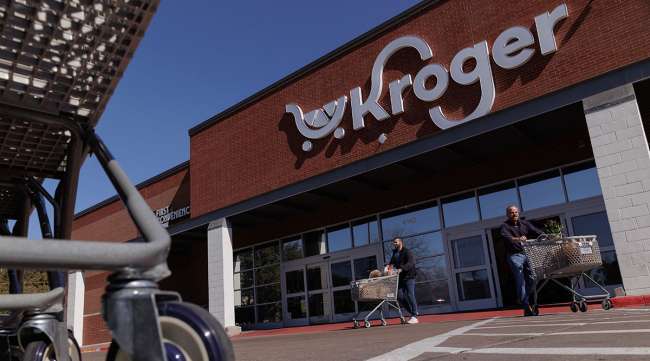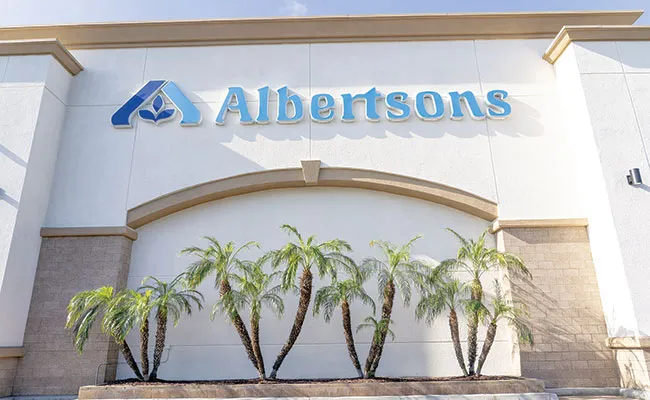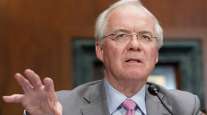Bloomberg News
Kroger’s $24.6 Billion Albertsons Deal Blocked by Judge

[Stay on top of transportation news: Get TTNews in your inbox.]
A judge blocked Kroger Co.’s $24.6 billion acquisition of Albertsons Cos., finding the takeover would lessen competition for U.S. grocery shoppers in a ruling that marks a likely death knell for the deal.
In a decision filed in Oregon federal court Dec. 10, U.S. District Judge Adrienne Nelson found in favor of the U.S. Federal Trade Commission. The agency had argued that the proposed tie-up violates U.S. antitrust law and that a divestiture of hundreds of stores to C&S Wholesale Grocers wouldn’t do enough to replace the lost competition.
Kroger and Albertsons rank Nos. 26 and 42, respectively, on the Transport Topics Top 100 list of the largest private carriers in North America, and Kroger, Albertsons and C&S rank Nos. 3, 5 and 9, respectively, on the TT grocery carriers list.
“There is ample evidence that the divestiture is not sufficient in scale to adequately compete with the merged firm and is structured in a way that will significantly disadvantage C&S as a competitor,” Nelson wrote. “The deficiencies in the divestiture scope and structure create a risk that some or all of the divested stores will lose sales or close, as has happened in past C&S acquisitions.”
Nelson’s decision is a major victory for the FTC and its outgoing Chair Lina Khan, who came under harsh criticism from conservatives and business groups for stepped-up antitrust enforcement under the Biden administration.
“Today’s win protects competition in the grocery market, which will prevent prices from rising even more,” said FTC spokesperson Douglas Farrar. “This statement win makes it clear that strong, reality-based antitrust enforcement delivers real results for consumers, workers, and small businesses.”

An Albertsons supermarket in Santa Ana, Calif. (Kyle Grillot/Bloomberg News)
A C&S Wholesale spokeswoman said the company is disappointed by the court’s decision and that it looks forward to seeing how Kroger and Albertsons will determine the next steps of the proposed deal.
Kroger and Albertsons didn’t immediately respond to requests for comment. Attorneys for the companies have said the acquisition would probably be called off if the judge ruled against the deal.
Kroger shares jumped as much as 6.1% in New York trading Dec. 10, extending earlier gains. Albertsons slumped as much as 10%.
The FTC’s case was the most consequential of three pending lawsuits that challenged the tie-up. Washington Attorney General Bob Ferguson, who was elected in November to be the state’s next governor, sued to block the deal in state court, and a judge was expected to issue his decision later Dec. 10. Colorado’s attorney general also filed a separate lawsuit in state court that remains pending.
Specific Market
Nelson agreed with the FTC that supermarkets constitute a specific market, countering the companies’ argument that the market extends to online retailers like Amazon.com Inc.
“Supermarkets are distinct from other grocery retailers,” Nelson wrote. “Supermarkets offer a larger selection of fresh and non-perishable items, a one-stop shopping experience that appeals to a particular consumer’s preference to meet all their grocery needs in one location, and a customer service focus with deli, bakery, meat and other specialized departments.”
The ruling marks a disappointing end to a two-year odyssey by Kroger and Albertsons, which sought to become a bigger player with a more substantial national footprint to better compete against larger, nonunionized rivals like Walmart Inc.
Lori Heino-Royer of Waabi discusses the latest developments, breakthroughs and key industry partnerships in autonomous trucking. Tune in above or by going to RoadSigns.ttnews.com.
Kroger and Albertsons agreed to combine in October 2022 in what would have been the biggest U.S. grocery deal in history, bringing together more than 4,000 stores across 48 states and Washington, DC.
Kroger will likely turn its focus back to improving and investing in its existing network of about 2,750 stores. Albertsons, on the other hand, could emerge again as a deal target but is expected in the near term to invest in its roughly 2,270 stores and technology.
The proposed deal has been a political hot potato, drawing pushback from elected officials, union groups and consumer advocacy firms. The companies vowed to spend $1 billion to cut prices, $1.3 billion to improve store conditions and $1 billion to raise worker wages and benefits following the deal.
The FTC has increased antitrust enforcement under the Biden administration, though the results in court have been mixed. The FTC lost a challenge to Microsoft Corp.’s acquisition of Activision Blizzard. But more recently the antitrust agency won two other merger challenges against Illumina Inc. over its purchase of startup Grail and over Tapestry Inc.’s planned $8.5 billion acquisition of Capri Holdings.
Arguments
The companies and the agency fought their case in court for three weeks over the summer in Oregon, as grocery inflation came back into the political spotlight ahead of the U.S. presidential election.
Grocery inflation hit a four-decade high in 2022 due to higher costs of labor, transportation and ingredients. Price increases have moderated and are expected to stay within historical ranges, though many American shoppers still say expensive groceries continue to squeeze their ability to spend.
The FTC argued that the deal would harm consumers by eliminating competition on prices and quality, making the combined entity less likely to improve its services by offering flexible hours and pickup services. It said the grocers would have more leverage over workers, which would slow wage growth and worsen benefits, and that the proposed divestiture would be inadequate.
The agency tried to depict Kroger and Albertsons as the most direct competitors. It said the deal would combine the two largest “traditional supermarkets” in a market that includes Walmart and Target but does not include Amazon, Costco, Aldi and dollar stores.
The companies argued that such a definition is “antiquated” and no longer describes how people shop and pointed to various changes they have made in response to newer threats. The grocers also said joining forces would help them increase market share and improve technology to compete with Amazon, Walmart and other companies.
Walmart, Amazon and Costco Wholesale rank Nos. 1, 12 and 47 respectively, on the private TT100.
Want more news? Listen to today's daily briefing below or go here for more info:





